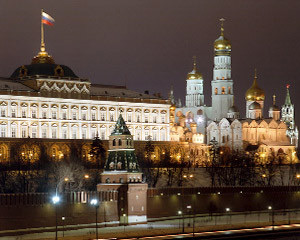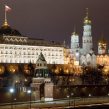
The Law on Russia’s Federal Budget for 2011
Publication: Eurasia Daily Monitor Volume: 8 Issue: 11
By:

On December 24, 2010, the Russian government’s official newspaper, Rossiyskaya Gazeta, finished the publication of Russia’s Federal Law of December 13, 2010 No 357-FZ “On the Federal Budget for 2011 and the Planned Period of the Years 2012 and 2013,” which it had begun publishing one week earlier.
The creators of the document managed to fit it into a record number of 2,891 pages in A4 format. In three years, the paper volume of the three-year budget increased by 1,174 pages, or by 68 percent. While three issues of the government newspaper sufficed for the publication of the federal budget itself, the law on the budget took three newspaper pages and its annexes ran to 85 more pages. Given the fact that this is the only notable success of those who worked out the federal budget, it might be worth taking a closer look at their not so commendable achievements presented to Russians for the New Year.
One such achievement is that for the first time the share of the secret and top secret appropriations in the 2011 budget reached 12.25 percent, which is 1.306 trillion rubles ($43.39 billion). In this regard, it should be recalled that following the “intervention” of Russia’s state-minded economists, data on the total appropriation for the sections and subsections of the functional classification of the federal budget expenditures have not been published in the federal law on the budget since 2008, although these data quite openly accompany the relevant draft bills. The new federal law is of course no exception. As a result, it is a mission impossible to figure out Russia’s federal budget, not only for ordinary Russian citizens, but also for such prominent economists as Evsei Gurvich whose article “Trying to Read the Budget” appeared in Rossiyskaya Gazeta on December 17 (https://www.rg.ru/2010/12/17/budget.html), timed to coincide with the beginning of the publication of the budget.
Even if the trivial mistake is ignored, where the share of GDP is used instead of the share of budget expenditures, based on the diagram printed in Rossiyskaya Gazeta it must be stated that all the author’s assessments and conclusions refer to the government’s draft federal budget (https://www.minfin.ru/common/img/uploaded/library/2010/10/proj_FB_2011-2013_v_GD.zip), rather than its final version in the form of Federal Law No. 357-FZ, signed by the President, Dmitry Medvedev, on December 13, 2010 (https://www.minfin.ru/common/img/uploaded/library/2010/12/fz357_ot_131210.zip).
So, is there indeed any difference between them? Certainly, there are differences. In the two and half months when the project was being deliberated upon in the Federal Assembly, budgetary appropriations underwent modifications of tens of billions of rubles in several sections and subsections of the classification, which itself is not by any means surprising. But the paradox is that Russians learned about these changes in the budget a few months later from the explanatory note from the finance ministry that was submitted to the Federal Assembly together with the new version of the draft federal law. Until then, Russian citizens, including both ordinary people and economists “were not eligible” to know the truth about their federal budget on the grounds of such important considerations as budget secrecy, national security and state secrets.
Of course, one should not be worried about such “trivia,” since the truth in Russia, obviously, needs to be known by those who are “eligible.” This would be the case if President Medvedev had not made a speech at the Gorokhovets military training range (https://www.kremlin.ru/transcripts/9609) on November 25, 2010, promising to keep annual national defense spending at the level of 2.8 percent of GDP until 2020, notwithstanding the fact that already in 2009 these expenditures had actually exceeded 3 percent of GDP. The appropriations planned for 2011 under the heading “National Defense,” in compliance with the November 30, 2010 No. 3.5-07/1681 resolution of the Federation Council’s (the upper chamber of the Russian legislature) Committee on Defense and Security, constitutes 14.3 percent of Russia’s federal budget, which corresponds to 3.02 percent of GDP or 1.524 trillion rubles ($50.64 billion). And here is yet another “unnoticeable” achievement: the expenditures under the heading “National Defense” will increase by as much as 20 percent, even though Russia is suffering from a budget deficit and uncontrolled inflation. It should be clarified that the aforementioned provisions of the law are not published in their entirety, and therefore it is not possible to estimate their size without using other sources of reference.
In this regard, the author recalls the practice in the Soviet era, described by Yuri Maslyukov and Yevgeni Glubokov (https://www.redstar.ru/2010/07/02_07/4_04.html), when the military expenditure of the USSR was so strictly classified that not even all members of the Politburo of the CPSU (if anyone still remembers what it means) knew about it; and those select few who were “eligible” for such secret information would have the numbers describing military spending written in their working papers in pencil by a specially designated official of the Central Committee apparatus.
Apparently, the situation now is the same in the Russian leadership; not all of them are familiar with the numbers. Thus, Deputy Minister of Finance, Anton Siluanov, stated on June 3, 2010 (https://www.prime-tass.ru/news/0/%7BD3207A20-1515-4CAA-A52C-9651D8F84575%7D.uif) that his agency was fully ready to further increase military spending at the expense of Russian taxpayers. According to Siluanov, “Defense spending in 2010 was 2.6 percent of the federal budget. In subsequent years, defense spending will increase. In 2011 it will reach 2.9 percent, and in 2012 – 3 percent, and in 2013 – 3.2 percent.
Does Siluanov actually know the figures or not? The point is that in 2010 under the “National Defense” of the federal budget, it was planned to spend more than 2.8 percent of GDP, not 2.6 percent; and the deputy minister was not quite accurate on the figure for 2011.
The difference in percentage points of 0.1-0.2 percent of GDP is a trifle and should not discredit Siluanov – who has so successfully coordinated the four-fold increased appetite of the Russian military-industrial complex in light of the new state armaments program for the years 2011-2020. However, Finance Minister, Aleksey Kudrin, said after the presidential address to the Federal Assembly on November 30, 2010 that Medvedev’s intention to secure 20 trillion rubles ($664.62 billion) for this program “was a new task” (https://www.minfin.ru/ru/press/speech/index.php?id4=11371). That is, it transpired that Kudrin does not know.
On December 21, another Deputy Finance Minister, Sergei Shatalov – who apparently is also in the category of “not eligible” – acknowledged that the federal budget for 2011-2013 did not include many expenditures that “had already been announced, and first of all it was defense spending” (https://newsru.com/finance/22dec2010/budjet.html). Here it seems that Russians have a surprise gift for the New Year: the document on the federal budget that has just been signed into law already needs to be revised, if Shatalov is properly understood.
Indeed, it is a natural consequence of a situation where the federal budget looks like a pig in a poke, and the budget process in Russia is increasingly reminiscent of a secret intelligence operation. It is not clear whether President Medvedev knows (at least from his assistants) that spending 20 trillion rubles on the weapons program in Russia is impossible without increasing the share of the national defense up to 4.5 percent of GDP, at a minimum. What is obvious though is that the Russian leadership’s demonstrative frivolity in dealing with the figures must be the logical result not of the economic prowess of the country, but rather of a political irresponsibility characteristic of the power vertical established in Russia in recent years.
Even the “knowledge” of Prime Minister, Vladimir Putin, cannot help the situation. Although Putin really knows, he is “afraid,” which he openly admitted in Severodvinsk on December 13, 2010 (https://premier.gov.ru/events/news/13391/, in English version his fear almost vanished https://premier.gov.ru/eng/events/news/13391/). And no freedom of speech (https://eng.kremlin.ru/transcripts/193) will help either. The poor Russian media have no way of knowing the truth about the state budget. They cannot be ordered to ask WikiLeaks for help (https://ruleaks.net/) and the Chamber of Control of the Russian Federation cannot provide any assistance to them (https://www.kommersant.ru/doc.aspx?DocsID=1554704). Maybe, it is time to once again return to a policy of glasnost (transparency) in budget expenditures, as it was in 1866 during the reign of Alexander II or at least like in 1935 under Josef Stalin. Otherwise, if the current trend continues, there will be soon only “open” part in the budget law instead of the total federal expenditure.




